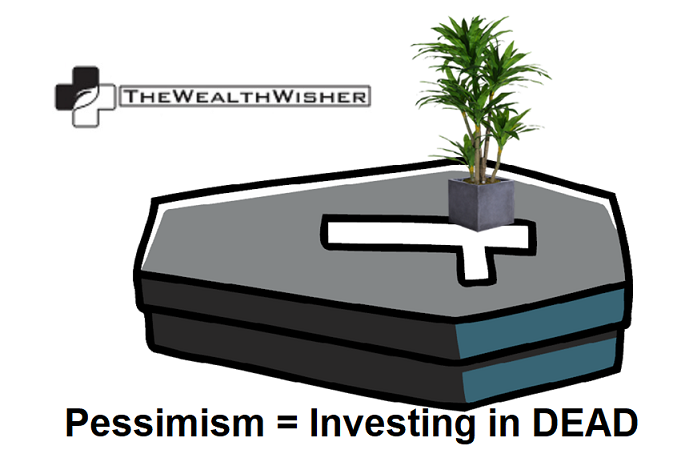Last 15 Days, have been so much depressed from Equity Investing point of view. Investors who are seasoned had a chilly! As usual, media has started firing all canons of negative news and finally it is impacting again. Last week a prominent Newspaper cover story was – How To Tackle Recession? So fear of “recession in India” is the new headline!
My question – DID YOU INVEST IN DEADS? Dead Companies, Dead Markets or Dead Economy!
NO… Certainly not!
We invest in Live & Growing Companies & motion-filled economy.
So, why so much outrage when markets go down or correct? Why a call for Dooms Day?
Why are investors holding investments for “better” markets?
Why are people not comfortable when they see 1 year, 2 years and even 3 years negative?
Why are investors stopping SIPs?
Why are investors looking for safety net like Debt & Gold despite having long term horizons?
Do you fear Recession? Are you looking for ways to escape it?
Will Equity Market bounce back ever?
Is it all DEAD?
Recession in India…Is this the First?
Yes, the stock market’s fall is painful, but the pain is reduced if we remember that we have survived and come out of worse falls in the past.
The large-cap BSE Sensex has fallen 9.8% from its peak in June 2019. This is a much smaller fall compared to the falls it has faced between 1986 – 1988, between Mar 1992 – Nov 1992, between Feb 2000 – Sep 2001, and between Dec 2007 – Feb 2009.

Of course, we are not predicting that the market’s fall will reverse from now on, but the point is, we have seen much worse falls before. Recession in India has history.
The same is true for midcap stocks. Post the Lehman crisis in 2008, the BSE Midcap index fell 70.5% in 11 months. In 2010-11, the midcap index fell 38.2%, and between Dec 2012 and Aug 2013, it fell 25.5%. In the last year and a half, the same BSE Midcap Index has fallen 26.6%.

So it is NOT THE FIRST TIME.
You need Just ONE reason TO DIE,
But there are MANY REASONs which CAN BRING BACK LIFE… AGAIN
Some of these are:
- The GST, despite initial glitches, is a path-breaking reform. Quarter by quarter we are getting more tax. Government has been accommodating with changes in the GST rates and reduction in the number of slabs. It will have a beneficial impact on India’s economy.
- The market de-linkage of fuel prices was a big reform.
- The insolvency and bankruptcy code is a step in the right direction. You have cases where offenders are willing to pay and close the case.
- The RERA Act is cleaning up of the real estate sector. It is going to professionalize the most unprofessional sector of the economy.
- The better disbursement of subsidies through direct benefit transfer has reduced the leakages in the system.
- Indian equities are trading at 19.7x FY20E earnings. All key markets continue trading at a discount to India.
Of course there are drawbacks; of course, there are inadequacies.
But then no situation is ever going to be perfect. These structural changes make us feel confident that the next phase of growth would be a healthier one. It is a matter of time. Recession in India is a phase of correction amplified with pessimism.
Let us not forget the following:
- Our country still has one of the highest growth rates amongst all the major economies of the world.
- This is a country with a diversified base of companies, both in manufacturing and services. Agriculture also plays a big role.
- There are many companies that are competitive, can be expected to remain so, and are now, thanks to this correction, available at prices that are far more acceptable than a couple of years ago.
- There have been a plethora of Start-Ups. Disrupting the old ways of doing things or inventing new tech. Ola, Zomato, Byjus, Acko look unstoppable.
- Govt intervention is actually very visible as they are continuously rolling sector-specific sops to boost economic cycle.
Lastly, let us not forget that there are only four things that really matter to an investor:
(a) The competitive position of the company or the investment, and an assessment of how sustainable it is.
(b) The company’s ability to grow its earnings sustainably.
(c) What sort of people are running the scheme/company and
(d) At what price is its available?
I won’t say it is a “sale” or “bargain”. (Investing is far more serious than buying apparels)
I would say it is time to believe in buying & maintaining what we are supposed to or committed to buy.
“To accomplish great things, we must not only act, but also dream; not only plan, but also believe.” (Anatole France)
Recession in India may or may not happen – by I choose not to participate while investing for my future!
If only we are willing to abandon two traits
- The quest to invest in stocks “only on the way up” and staying away from stock markets as long as we believe we have crossed the bottom. DID anyone suggest that stocks only go up?
- The obsession about predicting how the stock market would move, or how individual stocks would move. STOP being negative & spreading pessimism.
AND you stay invested or NOT! The market is not DEAD!
It’s going to start rising again before you can notice – It needs just one reason (Out of Many) to LIVE AGAIN.
Share with me your views… Are you scared or depressed looking at the present economical condition? What do you think- is long term investing DEAD?
YOU may like to read-








